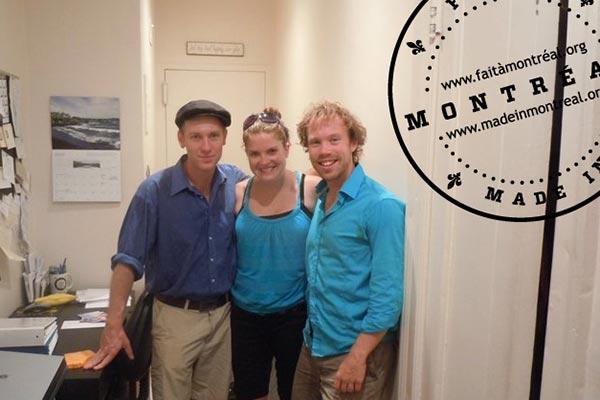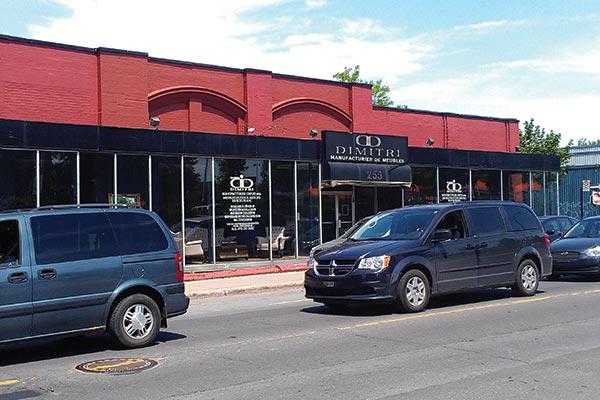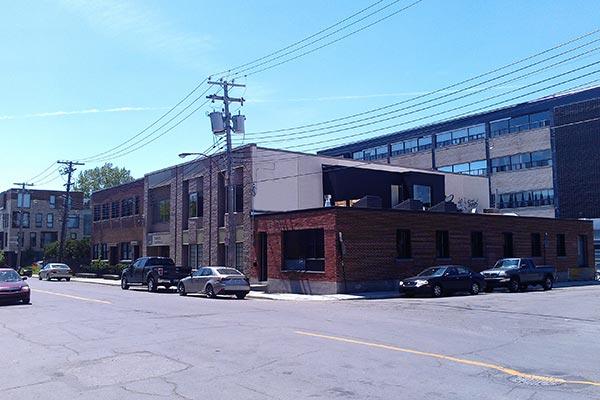- FMA
- The Fabricator
- FABTECH
- Canadian Metalworking
What’s Happening in Our Cities?
A close-up look at urban manufacturing and the Made in Montreal initiative
- By Steve Charters
- August 14, 2014
- Article
- Management

Made in Montreal co-founders and team members (left to right) are Alex Carruthers, executive director; Jill Merriman, external adviser; and Steve Charters, director of research.
If you were to ask a random person on the streets of Montreal what products are being manufactured in this city, you’d likely be met with confused looks and comments along the lines of “Do they still make things here?” or “Hasn’t all that moved to China?” Some could probably point to aerospace manufacturer Bombardier or Molson’s brewery, but that would be about it.
This is not surprising. A lot of manufacturing now happens in Asia, and certainly Montreal is no longer at the center of Canadian manufacturing as it was for nearly a century up until about the 1970s. Due to globalization, changing technologies, faster international transportation, and myriad other factors, many of the largest manufacturers shut down and moved years ago. The city’s ubiquitous red brick factory buildings are now brimming with design and tech firms, condos, and lofts. Montreal is known worldwide for its rich, creative environment, though many of its products are nontangible: music, software, film, and video games.
And yet today manufacturers are operating on the island of Montreal, making all sorts of products. Thousands are employed in this sector, and while they don’t have the same profile as chefs and musicians, they too contribute to the energy, creativity, and vibrancy that make Montreal such an interesting place to live. So, who are Montreal’s urban manufacturers, and what do they make?
Enter Made in Montreal (MIM), a nonprofit devoted to raising the profile of Montreal’s urban manufacturing scene. MIM takes the position that urban manufacturers—people making things locally—are important contributors to rich, robust, and diverse urban economies, and that more can be done to support the sector.
Who Are Today’s Urban Manufacturers?
Globalization of manufacturing notwithstanding, cities like Montreal present some intriguing location advantages. Generally speaking, cities are particularly good for small and medium-sized manufacturing enterprises (SMMEs) that may find no advantage to being located in suburban industrial parks or far from urban areas. The businesses may be too small, too specialized, or too tied to location and local markets to migrate across the Pacific. Larger manufacturers may locate in a metropolitan area to access a skilled and educated workforce.
Today’s urban manufacturers look different from decades past. Billowing smokestacks, contaminated land, and sweatshops are largely gone. Modern manufacturers are often leaders in product design and innovation, producing unique and specialized products. Others are focused on freshness—where would Montreal be without its bakeries and breweries pumping out bagels and beer? Some play important roles in emerging technologies and the increasingly important green technology sector.
Why Should a Company Consider Locating in Montreal or Another Urban Environment?
Urban manufacturers rely on nearby, deep networks of complementary businesses and access to abundant consumer and labor markets that are available only in metropolitan areas:
•City dwellers are often the main consumers of the higher-end, smallbatch, specialized products such as furniture, fashion, and custom household designs that are made by small manufacturers.

Dimitri Fine Furniture designs and manufactures custom furnishings from its urban location in Montreal.
•Cities have constant infusions of new and often skilled labor via immigration. In Quebec, nine out of every 10 immigrants live on the island of Montreal, and some of them end up working in manufacturing.
•Urban areas contain numerous universities, colleges, trade schools, and insertion programs that generate new designs and technologies, and the next generation of entrepreneurs.
Cities also offer attractive quality-of- life opportunities for entrepreneurs and their employees. Critical infrastructure, especially transit and transportation hubs, is a key urban advantage (for business and for lifestyle). The rich cultural scene and relaxed joie de vivre of Montreal are undeniably reasons that some entrepreneurs choose to locate here.
Why Should a City Pursue Manufacturing?
The central argument that MIM and many others espouse is that for cities to thrive, they can’t be just service or information economies, nor should we as a society allow ourselves to be a consumer economy that relies exclusively on imports. A sustainable urban economy must include a range of employment and entrepreneurial opportunities for people of all backgrounds. Manufacturing is an important part of that diversity, but it is often the most overlooked sector in today’s cities.
Manufacturing is still an important employer in Montreal: it’s a relatively lower-barrier sector, available to people from many different education levels and backgrounds, offering both highly skilled and low-skilled employment. In our tricky linguistic environment, manufacturing is particularly important for employing people who have difficulties in French and/or English, both essential to front-line service jobs. As such, manufacturing represents an important middle ground on the employment spectrum, situated between high finance on one end and call centers on the other. Manufacturing can offer good jobs at wages that are typically higher than most retail and fast-food jobs.
What Steps Should Government Entities Take to Attract Urban Manufacturers?
There is no denying that the urban manufacturing sector has trouble making inroads with local policymakers in many cities. Some municipal governments think of manufacturing as an urban nuisance, if they think about it at all. But it’s not all gloomy news. A growing number of decision-makers understand the value of encouraging manufacturing in our cities.
We have plenty of recommendations for government support, including:
•Recognize the manufacturing sector as an important element of a diverse urban economy and put this sector on the political agenda.

Made in Montreal is working to maintain industrial-zoned areas within the city to help entice more companies to locate in the urban setting.
•Remember the little guy. SMMEs (20 employees and fewer) represent the bulk of urban manufacturers and are much more tied to co-location and the networks that city locations offer. Megamanufacturers are certainly important, but they rely less on the intrinsic value of urban locations and can leave more easily.
•Municipal governments must control the conversion of industrial land. A lot of industrial space and old factories are being converted for residential and non- manufacturing uses. If too much land is rezoned and active businesses are forced out, the networks break down and businesses close down.
•Know the urban manufacturers and what they need. Some cities have comprehensive data on industrial land and existing businesses to help target further investment. Not every city has this kind of information, so organizations like ours are working to help fill this gap.
Cities are our economic engines: They are hives of activity for commerce, innovation, creativity, and knowledge exchange. And despite its vastness, Canada’s population is increasingly an urban country. There are plenty of uniquely urban advantages to benefit manufacturers. The right attitude and the right policies can help manufacturers become key contributors to sustainable economic growth for our cities.
Photos courtesy of Made in Montreal.
Made in Montreal (MIM) emerged from a common interest in urban economies and the place of manufacturing in contemporary cities held by three urban planning students—Alex Carruthers, Jill Merriman, and Steve Charters—studying at McGill University in 2010. The initiative started with a simple web directory to encourage Montrealers to seek out local products. This site was run sans budget from kitchen tables in St-Henri and Mile End.
After a few years spent finishing their degrees and pursuing other employment, the founders of MIM reconstituted in late 2012 as a nonprofit organization. It began full-time operations in 2013.
MIM focuses on promotion, research, advocacy, and urban planning services. It is part of the Urban Manufacturing Alliance, a U.S.-based network of like-minded cities and organizations working toward the common goal of supporting urban manufacturing.
Co-founder Steve Charters said, “We haven’t looked back since starting Made in Montreal, although we’ll be the first to admit that building a stable organization to support a business community off the mainstream radar is no easy task.
“Our membership now includes over 300 manufacturers, all operating on the island of Montreal. Our web directory remains one of our core services. We are also lending a hand to our colleagues in Toronto who are working tirelessly to set up TorontoMade.net.”
subscribe now


Keep up to date with the latest news, events, and technology for all things metal from our pair of monthly magazines written specifically for Canadian manufacturers!
Start Your Free Subscription- Trending Articles
- Industry Events
MME Winnipeg
- April 30, 2024
- Winnipeg, ON Canada
CTMA Economic Uncertainty: Helping You Navigate Windsor Seminar
- April 30, 2024
- Windsor, ON Canada
CTMA Economic Uncertainty: Helping You Navigate Kitchener Seminar
- May 2, 2024
- Kitchener, ON Canada
Automate 2024
- May 6 - 9, 2024
- Chicago, IL
ANCA Open House
- May 7 - 8, 2024
- Wixom, MI














